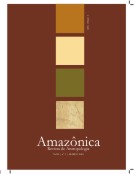TRANSMUTED BODIES. ORINOCO ANTHROPOMORPHIC FIGURES AS AN EXPRESSION OF THE RELATIONSHIP BETWEEN MEN, NATURE, AND CULTURE
DOI:
https://doi.org/10.18542/amazonica.v4i1.883Abstract
In Venezuela there has been little systematic research focused entirely on the pre-Columbian pottery human figuration. In this paper, using as a frame of reference the anthropomorphic figurative pieces of the egalitarian tribal societies Barrancoid-Saladoid in the Orinoco, we compare two regions and/ or cultures. Through formal deconstruction of parts for the definition of figurative patterns, we propose that anthropomorphic ceramic pieces were probably powerful vehicles used by societies to communicate personal and communal identities, as well as reveal socially accepted power relations between the individuals and their environment. Accordingly, worldviews are revealed and in-corporated in material representations such as the figurines. Keywords: anthropomorphic depiction, barrancoid series, saladoid series, Orinoco.Published
2012-06-17
Issue
Section
Original Articles


